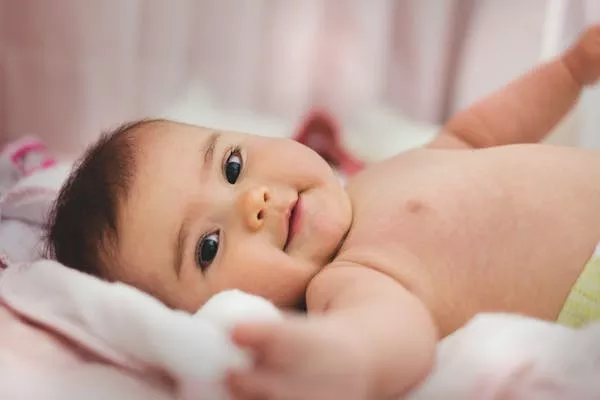When it comes to the well-being of our little ones, concerns about their health and development are natural. One common question that often arises among parents is, “Does cradle cap prevent hair from growing?” This article aims to shed light on this topic, providing you with a comprehensive understanding of the relationship between cradle cap and hair growth. We will delve into five key aspects to address this concern.
1. Understanding Cradle Cap: What is it?
Cradle cap, medically known as infantile seborrheic dermatitis, is a common skin condition that affects many newborns and young infants. It typically appears as greasy, yellowish scales or crusts on the baby’s scalp. While its exact cause isn’t fully understood, it is believed to be related to overactive sebaceous (oil-producing) glands. Contrary to its name, cradle cap is not solely confined to the scalp; it can also affect other areas rich in oil glands, such as the eyebrows and diaper area.
2. Impact on Hair Follicles: Does Cradle Cap Hinder Hair Growth?
One of the concerns parents often express is whether cradle cap can impede the growth of their baby’s hair. The good news is that cradle cap itself is unlikely to directly prevent hair growth. The scales and crusts associated with cradle cap typically do not affect hair follicles. Hair growth occurs from hair follicles beneath the skin’s surface, and cradle cap mainly affects the uppermost layer of the skin. However, if the condition is left untreated and becomes severe, it may cause discomfort and inflammation, which could indirectly impact the baby’s overall well-being.
3. Natural Course of Cradle Cap: Temporary Nature
Cradle cap is usually a temporary condition that tends to resolve on its own over time. Most cases of cradle cap clear up within the baby’s first year, and sometimes even within a few months. As the baby’s sebaceous glands become less active and their skin matures, the condition naturally diminishes. During this time, hair growth continues unaffected by the presence of cradle cap.
4. Proper Management: Promoting Healthy Hair Growth
While cradle cap itself doesn’t directly hinder hair growth, proper management is still essential. Gently washing your baby’s scalp with a mild, fragrance-free baby shampoo can help prevent the buildup of scales and crusts. Soft brushing with a baby brush can also be effective in loosening the scales. It’s important to resist the urge to pick at or scratch the affected areas, as this can lead to irritation and potential secondary infections.
5. When to Seek Medical Advice: Severe Cases and Concerns
In most cases, cradle cap is harmless and doesn’t require medical intervention. However, there are instances where medical advice should be sought. If the condition becomes severe, spreads to other areas of the body, or shows signs of infection such as redness, swelling, or discharge, it’s advisable to consult a pediatrician. Additionally, if you have concerns about your baby’s hair growth or overall health, discussing them with a healthcare professional can provide reassurance and guidance.
In conclusion, cradle cap is a common and generally benign condition that doesn’t directly prevent hair growth. Hair growth continues from the hair follicles beneath the skin, while cradle cap primarily affects the skin’s surface. Proper management and gentle care can help alleviate the discomfort associated with cradle cap and promote a healthy scalp environment for your baby. Remember that if you ever have concerns about your baby’s health or development, seeking guidance from a medical professional is always a prudent step.
FAQs about does cradle cap prevent hair from growing
Q: Does cradle cap prevent hair from growing?
A: No, cradle cap itself does not typically prevent hair from growing. Cradle cap, also known as infantile seborrheic dermatitis, is a common condition characterized by thick, yellowish, crusty patches on a baby’s scalp. It is caused by the excessive production of sebum (skin oil) and may be related to hormonal changes. While it may look concerning, it usually does not have a long-term impact on hair growth. Hair continues to grow underneath the affected areas.
Q: Can cradle cap cause hair loss in babies?
A: While cradle cap itself is unlikely to cause significant hair loss, in some cases, the gentle removal of the crusty scales during treatment might lead to a few hairs being pulled out. However, this should not result in permanent or noticeable hair loss. It’s important to be gentle when addressing cradle cap to minimize any potential hair removal.
Q: How can I treat cradle cap and promote healthy hair growth?
A: To treat cradle cap, you can follow these steps:
- Gently massage the baby’s scalp with a mild baby shampoo to help loosen the scales.
- Use a soft brush or fine-toothed comb to carefully remove the softened scales.
- Apply a gentle, hypoallergenic moisturizer or baby oil to the affected area to help soften the scales and prevent them from building up again.
- If the condition persists or worsens, consult a pediatrician for advice on more specific treatments.
To promote healthy hair growth:
- Maintain a healthy diet for both mother (if breastfeeding) and baby, as proper nutrition supports hair growth.
- Ensure the baby is getting enough sleep, as sleep is important for overall health and development.
- Keep the scalp clean and moisturized to create a favorable environment for hair growth.
Q: When should I be concerned about hair growth in my baby with cradle cap?
A: If you notice unusual hair loss or bald patches in addition to cradle cap, it’s advisable to consult a pediatrician. While cradle cap itself is not typically a cause for concern regarding hair growth, an underlying medical issue could be affecting hair development.


